Top 15 AI Visibility Tools to Track Your Brand in ChatGPT and LLMs in 2025


Top 15 AI Visibility Tools to Track Your Brand in ChatGPT and LLMs
Table of Contents
Serious about growing your business? Let’s plan exactly how to get you more leads, sales, and results—faster.
The way users discover brands online is changing fast — and it’s no longer just about ranking on Google.
Generative AI platforms like ChatGPT, Google’s AI Overviews, Perplexity, and Microsoft Copilot are rapidly becoming major information sources and traffic drivers.
This shift is profound, with traffic from AI tools increasing a staggering 165 times faster than traditional organic search, signalling a fundamental re-shaping of how content gets surfaced and cited.
For brands, this means that traditional SEO alone is no longer sufficient. The rise of AI-powered answers is changing how users interact with search results.
Nearly 60% of Google searches now end without a click to an external website, and some projections indicate this could surpass 70% by the end of 2025.
You now need to ensure your brand is visible, accurate, and cited inside AI-generated content, especially in these zero-click results where users gain information directly.
In this post, we’ve compiled a list of 15 top AI visibility tools built to help you track and improve your brand’s presence across AI platforms and Large Language Models (LLMs).
If you run a business, these tools can be game-changing; they show exactly where and how often your brand appears in AI-driven search. So, let’s begin and see what these tools actually are.
Marketing Research & Strategy
We help you understand your market and build smart strategies to attract more customers and grow faster.
- Detailed research into your competitors, customers, and market
- Custom marketing and growth plans that drive real results
- Clear action steps to increase traffic, leads, and sales
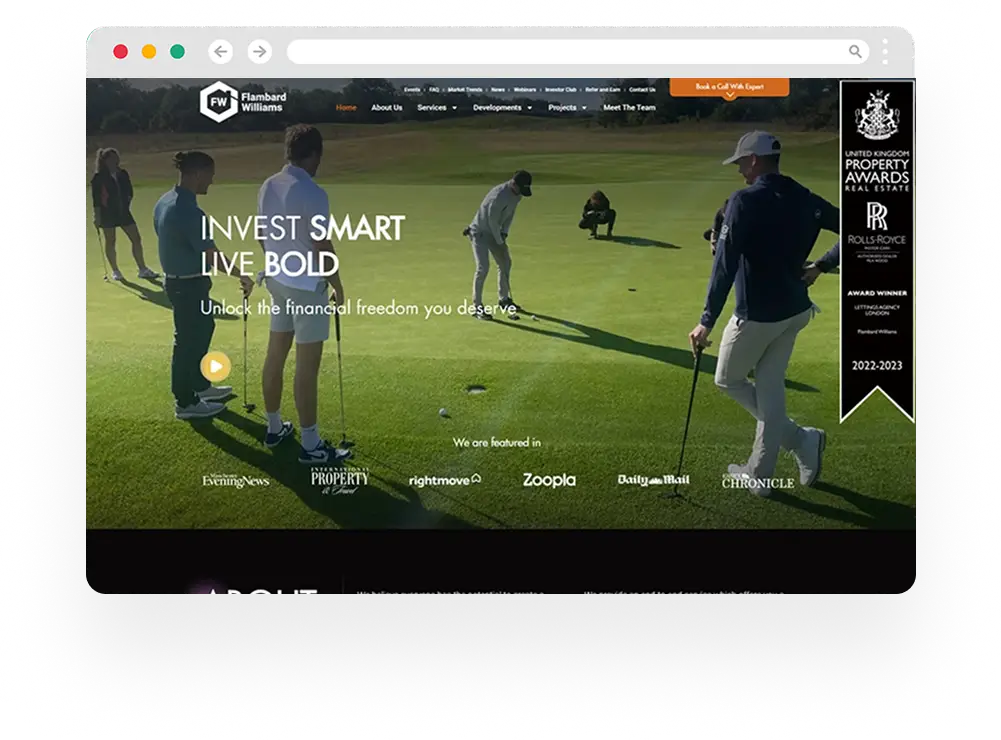
ADWORDS ROI
Cut Ad spend
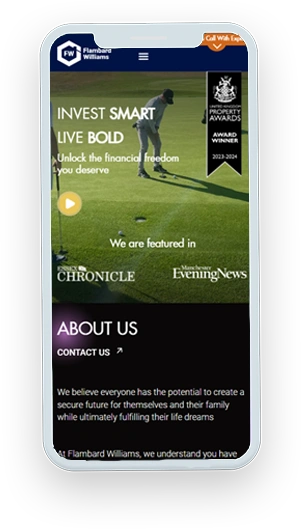
What are AI Visibility Tools?
An AI visibility tool is a software application designed to track and analyse how a brand appears in AI-generated search results and responses across platforms, including:
- ChatGPT
- Google AI Overviews
- Perplexity AI
- Microsoft Copilot
- Other LLMs and AI Search Engine Results Page (SERP) features
These tools provide metrics such as brand mentions and share of voice, offering actionable insights to enhance brand visibility within AI platforms.
Why are AI Visibility Tools Important?
You can’t improve what you can’t measure — and that’s exactly why AI visibility tools matter.
They help you track how often and how clearly your brand shows up in AI-generated answers across platforms like ChatGPT, Google’s AI Overviews, and Perplexity.
This is becoming increasingly critical. Google’s AI Overviews are now appearing for almost 55% of all Google searches, making them a dominant feature in information discovery.
Moreover, studies indicate a significant majority of consumers, around 70%, find AI-generated summaries incredibly helpful when researching products or services, underscoring their growing reliance on these AI outputs.
If your brand isn’t accurately represented and cited within these prevalent AI responses, you risk becoming invisible.
These tools provide the necessary insights to adapt and remain competitive in this AI-driven world.
Top 15 AI Visibility Tools in 2025
The market for AI visibility tools is dynamic and expanding.
These tools typically fall into two categories: traditional Search Engine Optimisation (SEO) platforms that have integrated AI visibility functionalities, and dedicated standalone AI visibility platforms.
The optimal choice depends on specific business requirements and budgetary considerations.
Below is a curated list of 15 leading AI visibility tools:
SEO Platforms with AI Visibility Features
These established SEO platforms have incorporated features to track page visibility within LLMs. The table below details their support for various AI platforms. Note that tool capabilities are continuously evolving.
1. SE Ranking:
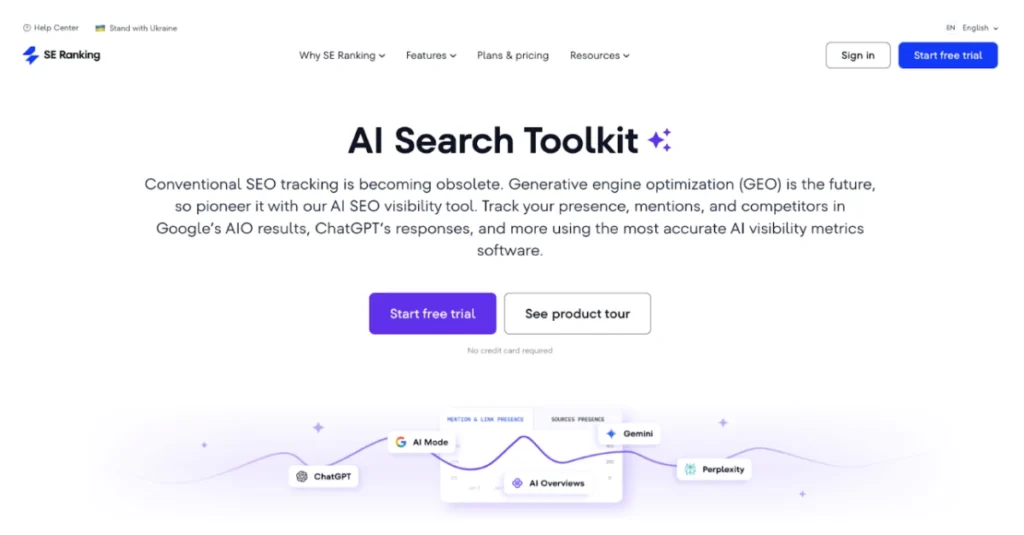
Source: SE Ranking
SE Ranking is a well-rounded SEO tool that now lets you track how your brand shows up in AI search results.
It’s especially useful if you’re already managing SEO and want to add AI visibility without switching platforms.
Their AI tracking features come with paid plans starting at £75 per month, and they offer a free trial so you can test it out.
AI Search Tracking:
- AI Overviews: Supported
- Microsoft Copilot: Supported
- ChatGPT: Supported
- Gemini: Supported
- Perplexity: Supported
- Claude: Not Supported
- Meta AI: Not Supported
- DeepSeek: Not Supported
2. Conductor:
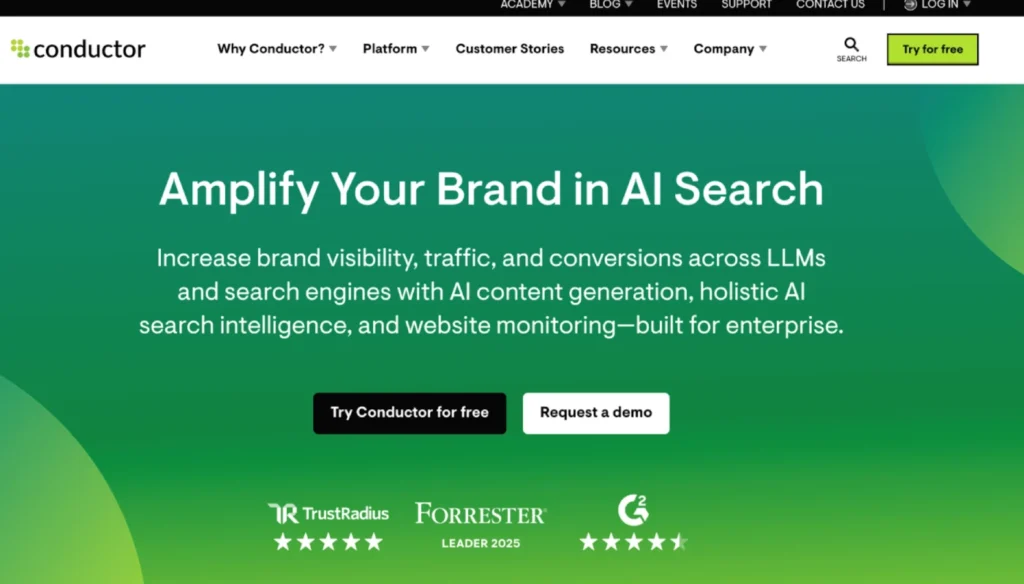
Source: Conductor
Conductor is designed for large companies with a lot of content to manage. They’ve added AI visibility features that help you see how your brand performs across different AI platforms.
Pricing isn’t listed; you’ll need to contact them directly, but they do offer a free trial. It’s a strong option if you’re dealing with a complex digital presence and need enterprise-level tools.
AI Search Tracking:
- AI Overviews: Not Supported
- Microsoft Copilot: Not Supported
- ChatGPT: Supported
- Gemini: Supported
- Perplexity: Supported
- Claude: Not Supported
- Meta AI: Not Supported
- DeepSeek: Not Supported
3. Omnia:
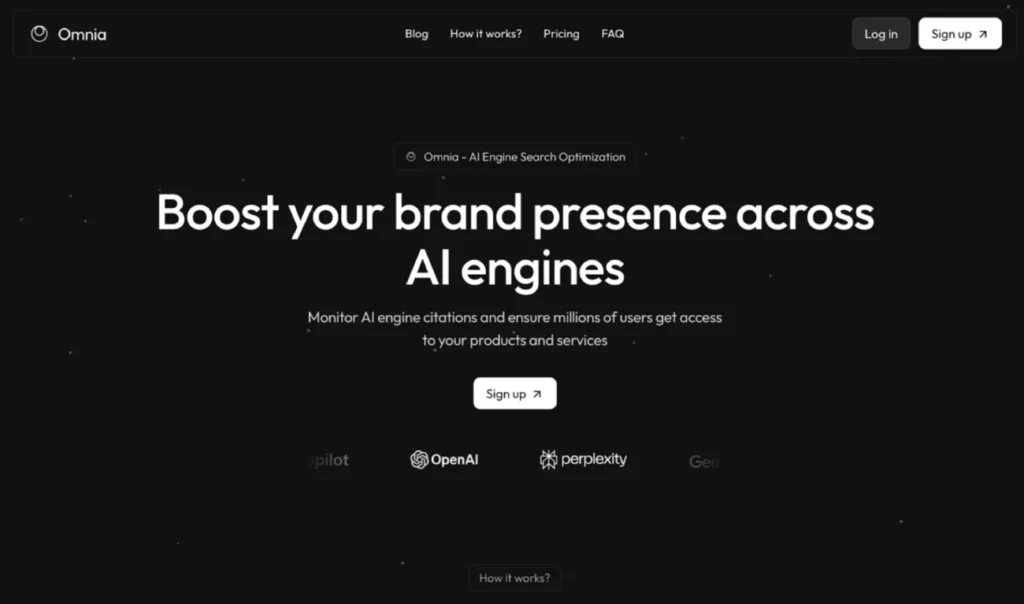
Source: Omnia
Omnia is a more affordable tool that combines SEO insights with new AI visibility features. It starts at €79 per month and includes a 14-day free trial.
It’s a good fit for smaller businesses or teams that want to track how they appear in AI-generated responses without overcomplicating things.
AI Search Tracking:
- AI Overviews: Not Supported
- Microsoft Copilot: Not Supported
- ChatGPT: Supported
- Gemini: Supported
- Perplexity: Supported
- Claude: Not Supported
- Meta AI: Not Supported
- DeepSeek: Not Supported
4. Similarweb:
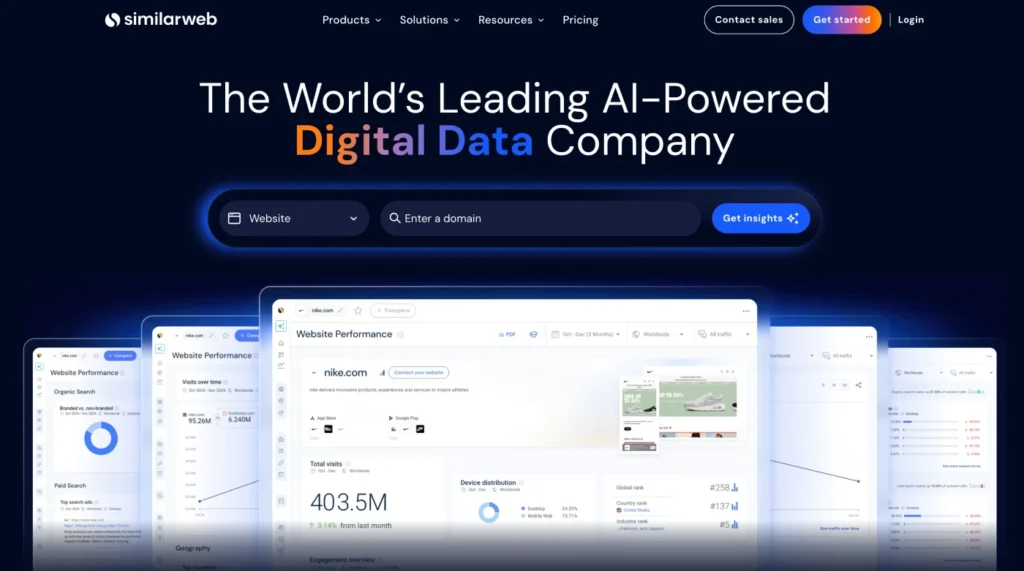
Source: Similar Web
Similarweb is known for giving detailed data on market trends and competitor performance.
Now, it also lets you see how your brand shows up in AI platforms. Plans start at $199 a month, but AI insights are an added cost.
There’s no free trial mentioned. If you want a broader view of your digital presence, including how you stack up against others, this tool is worth looking into.
AI Search Tracking:
- AI Overviews: Supported
- Microsoft Copilot: Supported
- ChatGPT: Supported
- Gemini: Supported
- Perplexity: Not Supported
- Claude: Not Supported
- Meta AI: Not Supported
- DeepSeek: Not Supported
Digital Marketing, SEO & PPC
- SEO to boost rankings and capture high-intent, AI-driven traffic
- Performance Marketing to run ROI-focused campaigns that convert
- Content Marketing to drive clicks, earn links, and build authority

5. Ahrefs:
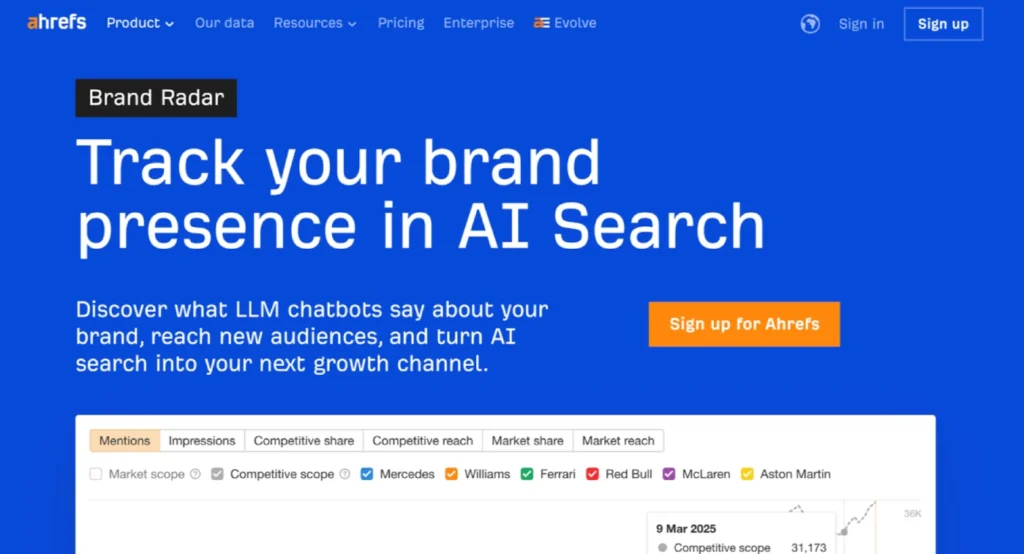
Source: Ahrefs
Ahrefs is a favourite among SEO professionals, and now it’s adding tools to track how your brand is used in AI-generated content.
It’s especially strong for backlink analysis and keyword research.
AI visibility features are included in their paid plans, which start at $129 per month. If you’re already using Ahrefs, these new features are a great bonus.
AI Search Tracking:
- AI Overviews: Supported
- Microsoft Copilot: Supported
- ChatGPT: Supported
- Gemini: Supported
- Perplexity: Supported
- Claude: Not Supported
- Meta AI: Not Supported
- DeepSeek: Not Supported
6. Semrush:
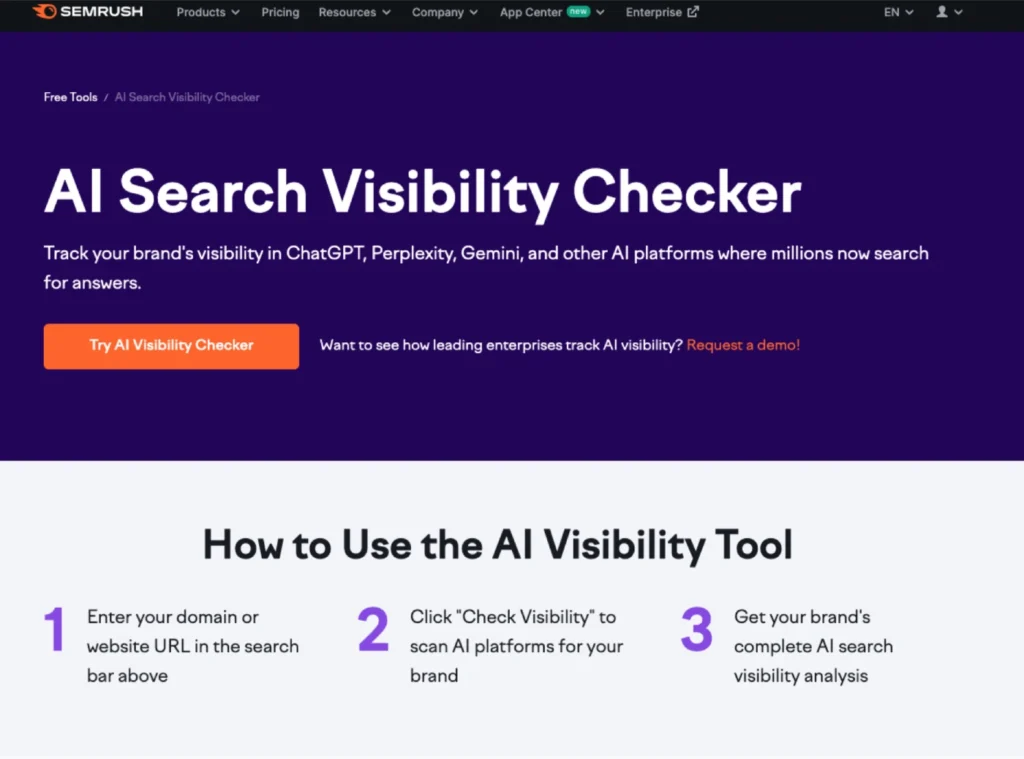
Source: Semrush
Semrush is another big name in SEO that’s now adding AI tracking into its platform.
It has a wide range of marketing tools, so you can handle SEO, paid ads, and now AI visibility all in one place.
Plans begin at $129.95 per month, and you’ll need a paid account to access the AI features. If you’re already using Semrush for marketing, this update makes it even more valuable.
AI Search Tracking:
- AI Overviews: Supported
- Microsoft Copilot: Not Supported
- ChatGPT: Supported
- Gemini: Supported
- Perplexity: Supported
- Claude: Not Supported
- Meta AI: Not Supported
- DeepSeek: Not Supported
7. BrightEdge
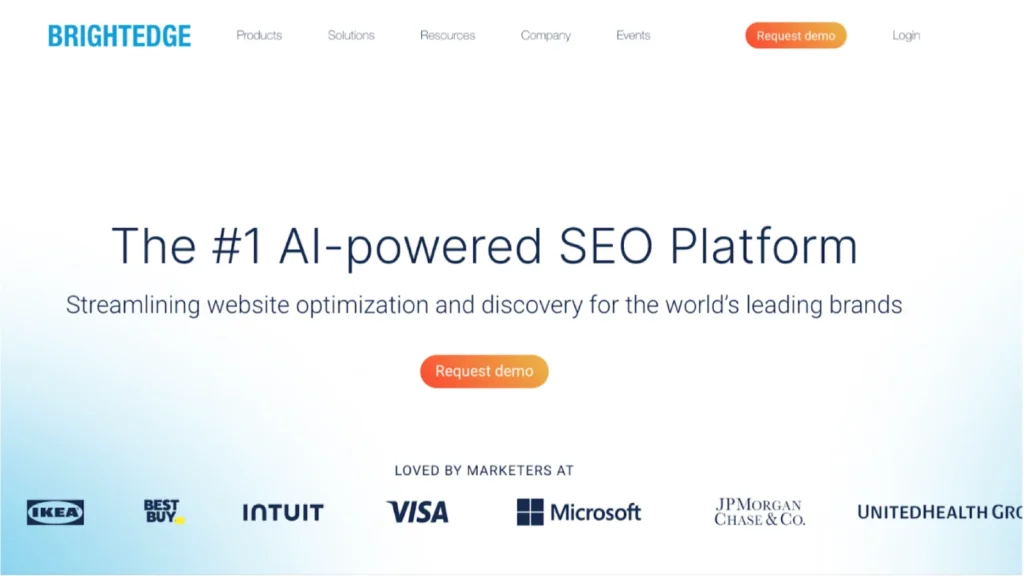
Source: BrightEdge
BrightEdge is an enterprise-grade SEO and content performance platform that has integrated AI search visibility tracking under its BrightEdge Copilot and SearchIQ features.
It’s built for large teams and agencies managing complex SEO strategies across multiple regions or verticals. Pricing is available on request and tailored to enterprise needs.
AI visibility tracking is baked into its core reporting suite, helping marketers monitor brand exposure across AI-powered experiences.
AI Search Tracking:
- AI Overviews: Supported
- Microsoft Copilot: Supported
- ChatGPT: Supported
- Gemini: Supported
- Perplexity: Supported
- Claude: Not Supported
- Meta AI: Not Supported
- DeepSeek: Not Supported
Standalone AI Visibility Platforms
These platforms are specifically designed for tracking brand visibility within AI search and LLMs, often providing more specialised and in-depth analytics.
These platforms are specifically designed for tracking brand visibility within AI search and LLMs, often providing more specialised and in-depth analytics.
8. Scrunch
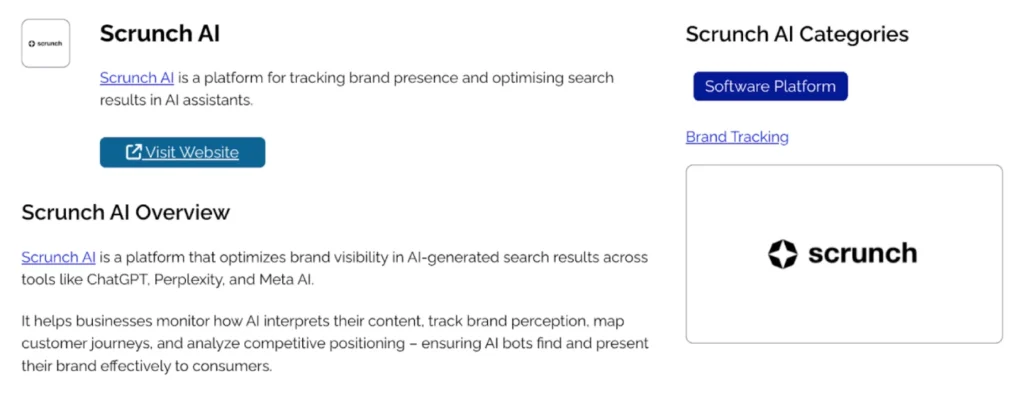
Source: Insight Platforms
Scrunch monitors AI platforms such as ChatGPT, Claude, Gemini, and others.
Its unique capabilities include persona-based geographical (GEO) testing and competitive share-of-voice analysis.
This allows for a nuanced understanding of brand encounters across diverse audience segments within AI responses.
9. Trackerly.ai
Source: Trackerly.ai
Trackerly.ai tracks brand presence on ChatGPT, Gemini, Claude, Perplexity, and Deepseek.
It provides a user-friendly, bulk prompt tracker from $27 per month, delivering daily insights into brand mentions and visibility across multiple LLMs.
10. Ziptie
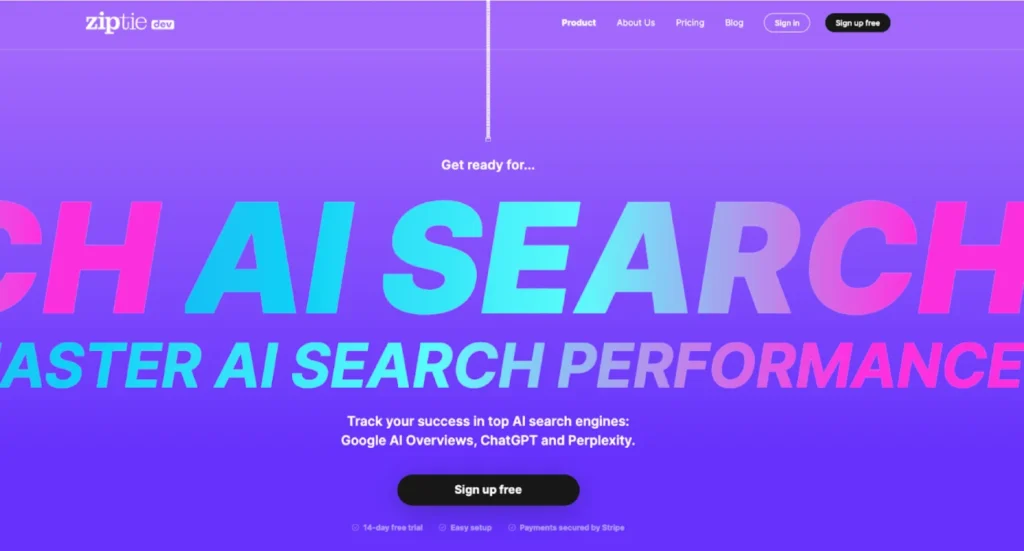
Source: Ziptie Dev
Ziptie offers visibility tracking for Google AI Overviews, ChatGPT, and Perplexity.
Its unique features include a Visual AI Success Score and the ability to track sentiment trends, providing a quick visual representation of brand performance and AI perception.
11. Quno AI
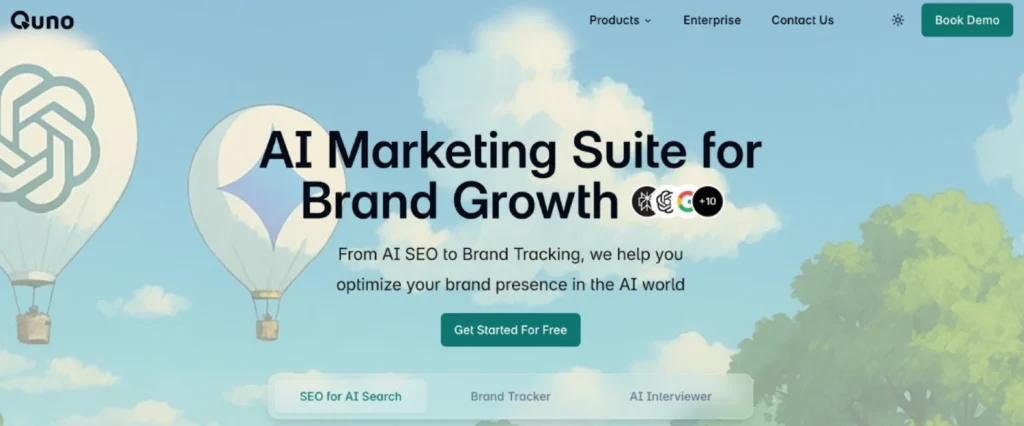
Source: Quno.ai
Quno AI focuses on visibility scoring for Perplexity, ChatGPT, and Google AI Overviews. It places emphasis on prompt-level discovery, helping identify specific user queries that trigger brand mentions in AI outputs.
12. AthenaHQ.ai
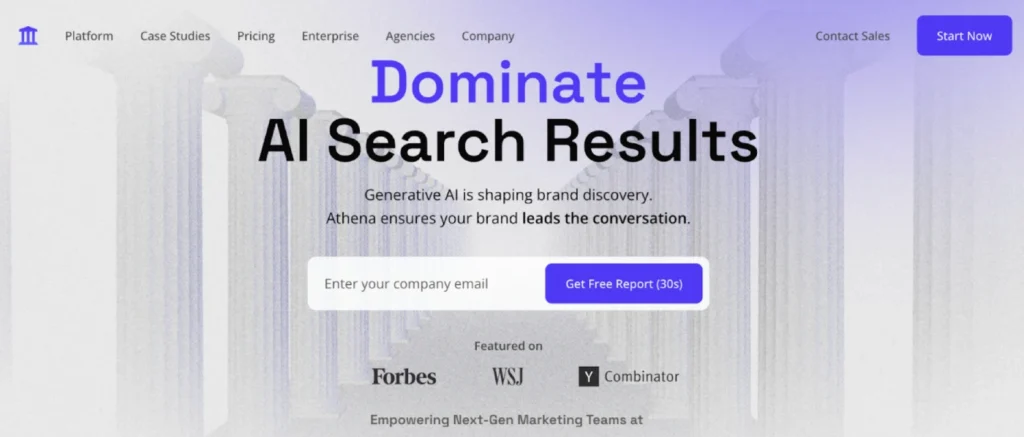
Source: AthenaHQ.ai
AthenaHQ.ai specialises in brand health monitoring across LLMs, specifically ChatGPT, Gemini, Claude, and Perplexity.
It incorporates detailed sentiment analysis and gap analysis to pinpoint areas for improvement in AI-generated content.
13. Goodie
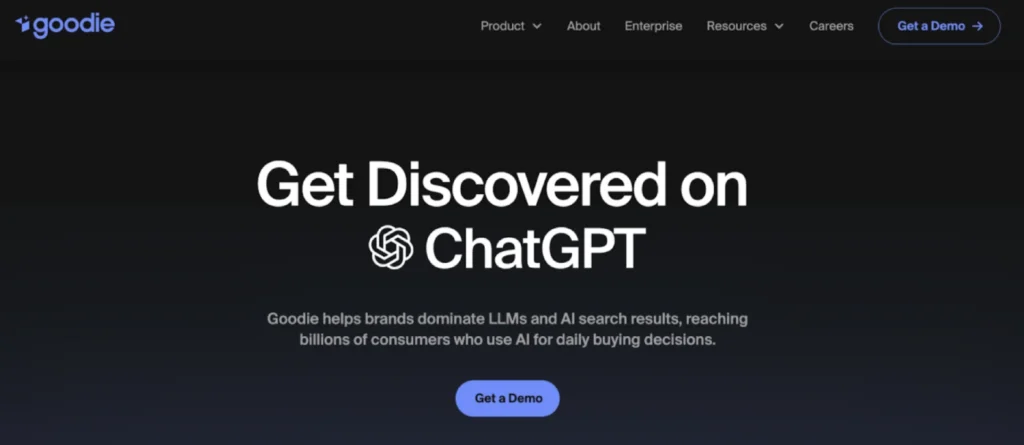
Source: Goodie
Goodie provides brand tracking for ChatGPT, Perplexity, Gemini, Claude, and AI Overviews.
It delivers valuable geo and language-based benchmarking along with optimisation suggestions, enabling tailored AI visibility strategies for specific regions and linguistic contexts.
14. Cognizo
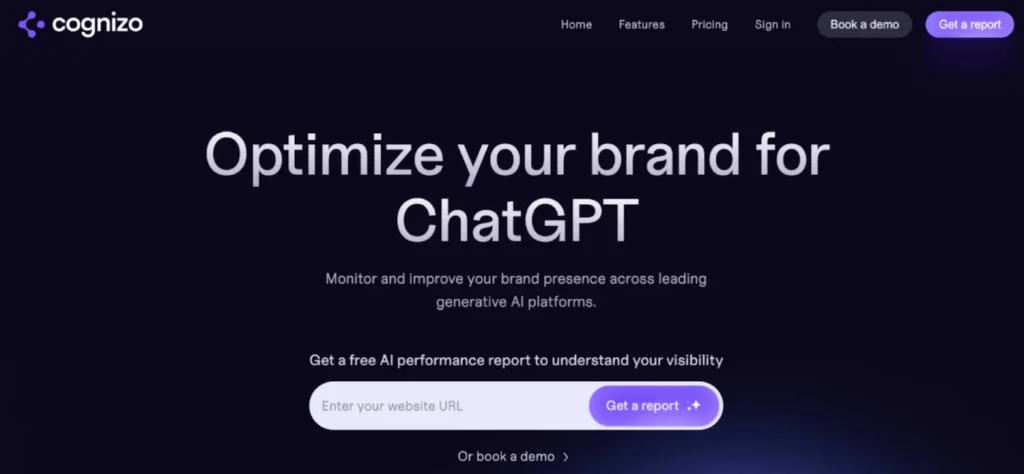
Source: Cognizo
Cognizo excels in identifying content gaps and recommending “job-to-be-done” next steps for ChatGPT, Perplexity, Gemini, Claude, and Meta AI. This guides content creation to address AI visibility deficiencies.
15. Peec AI
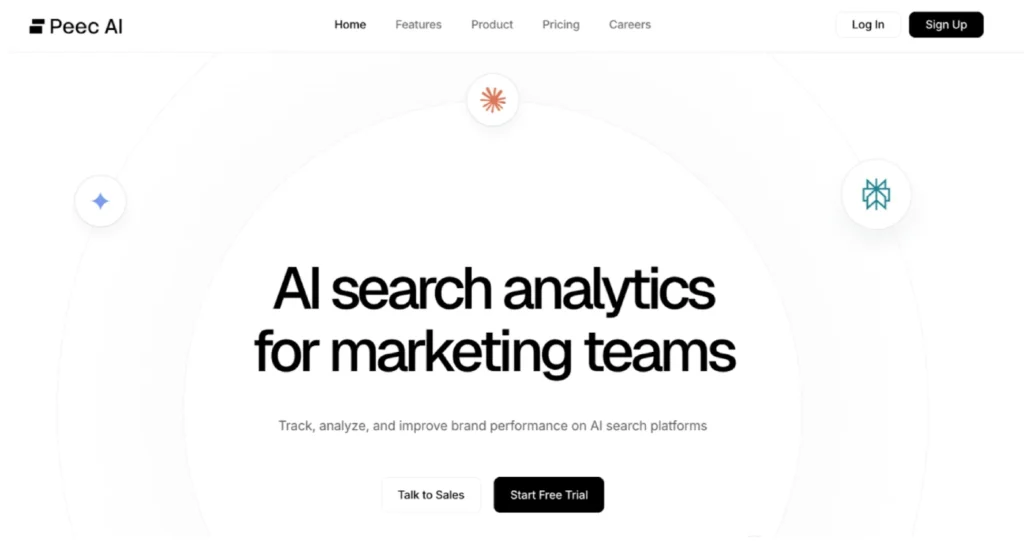
Source: peec.ai
Peec AI provides first-mention tracking for ChatGPT, Perplexity, and Google AI Overviews.
It also offers unlimited user seats under its €90–199 per month tiers, presenting a cost-effective option for teams prioritising initial brand visibility.
Marketing Research & Strategy
We help you understand your market and build smart strategies to attract more customers and grow faster.
- Detailed research into your competitors, customers, and market
- Custom marketing and growth plans that drive real results
- Clear action steps to increase traffic, leads, and sales

ADWORDS ROI
Cut Ad spend

What to Look for When Choosing an AI Visibility Tool
With so many tools out there, picking the right one can get confusing. Here’s what really matters when you’re choosing:
1. Which AI platforms it tracks
Make sure the tool actually covers the AI platforms your audience uses—like ChatGPT, Google AI Overviews, Perplexity, Claude, Gemini, and Copilot. Not all tools support everything, so double-check what’s included.
2. Brand mentions and citations
Does it show where and how your brand is showing up in AI answers? You want to track both direct mentions and more subtle references.
3. Competitor tracking
Can you see how your competitors are doing too? Tools that show share-of-voice or how often your rivals are mentioned can give you an edge.
4. Sentiment tracking
Are the AI platforms speaking positively about your brand—or not? Knowing the tone of these mentions can help you fix problems or double down on what’s working.
5. Prompt-level insights
Some tools show which prompts or questions actually trigger your brand to appear. That kind of insight can shape your content and messaging in a big way.
6. Integrations with other tools
Does it connect with tools like Google Analytics or Search Console? If yes, you get a fuller picture of your visibility across channels.
7. Ease of use
If it’s clunky or hard to navigate, your team won’t use it. Look for something clean and easy that gives you clear insights without a learning curve.
8. Pricing that fits
Some tools are made for big companies, others are better for small teams. Pick one that fits your budget and gives you the features you actually need.
The AI-Powered Future of Brand Visibility
AI isn’t just the latest tech buzz; it’s completely changing how people find and trust information. And for brands, that changes everything.
If you want to stay relevant, you can’t rely on traditional search alone. You need to know how your brand shows up in AI tools like ChatGPT, Google AI Overviews, and Perplexity.
That’s where AI visibility tools come in. These aren’t “nice to have” anymore, they’re essential.
When you understand how AI platforms talk about your brand, you can improve your content, strengthen your authority, and stay top of mind with your audience, even when there’s no click involved.
So start exploring. Use these tools to track your presence, learn what’s working, and take control of your visibility in this new AI-driven world.
Search is changing, and your brand needs to be part of the conversation.
Start Showing Up in AI Search Results
Is your brand ready to be seen, cited, and trusted in the evolving AI search landscape? Don’t let your content go unnoticed in AI-generated responses.
Let us help you develop a tailored Answer Engine Optimisation (AEO) strategy designed to enhance your brand’s presence and drive leads in this pivotal AI-first search era.
Frequently Asked Questions (FAQs)
What is the primary difference between traditional SEO and AI visibility?
Traditional SEO focuses on optimising content for search engine algorithms to rank highly in organic results.
AI visibility, conversely, specifically tracks how your brand is mentioned, cited, and summarised within AI-generated responses from large language models (LLMs) and AI overviews, which is a distinct and rapidly growing area of search.
Why is brand visibility in AI Overviews and LLMs more critical now?
Brand visibility in AI Overviews and LLMs is crucial because generative AI traffic is growing significantly faster (165x) than traditional organic search.
Consumers increasingly rely on AI for quick answers and summaries, meaning your brand needs to be present and accurately represented in these AI-driven responses to maintain relevance and awareness.
Can my existing SEO strategy cover AI visibility, or do I need new tools?
While a strong traditional SEO strategy (e.g., clear, well-structured content, schema markup) can positively influence AI visibility, it is often insufficient on its own.
Dedicated AI visibility tools, or SEO platforms with integrated AI features, are necessary to specifically monitor, measure, and optimise how your brand appears within AI-generated content, as AI models interpret and present information differently.
How do AI visibility tools measure brand mentions and sentiment?
AI visibility tools typically use natural language processing (NLP) and machine learning algorithms to scan AI-generated responses for explicit mentions of your brand name.
Sentiment analysis features then analyse the context around these mentions to classify the tone as positive, negative, or neutral, providing insights into brand perception.
What is "Share of Voice" in the context of AI visibility?
In AI visibility, “Share of Voice” refers to the percentage of AI-generated conversations or summaries in a given industry or topic where your brand is mentioned, compared to your competitors.
It indicates your brand’s relative prominence and recognition within AI-powered information streams.
Is it possible to influence how AI models summarise my content or mention my brand?
Yes, it is possible to influence AI models. Strategies include creating highly authoritative, factual, and clearly structured content; using clear headings and summaries; implementing robust schema markup; and ensuring brand information is consistent across all digital touchpoints (e.g., your website, Google Business Profile, etc.).
AI visibility tools help monitor the effectiveness of these efforts.
Are AI visibility tools suitable for all business sizes?
Yes, AI visibility tools are becoming relevant for businesses of all sizes.
While enterprise-level solutions offer extensive features and higher price points, there are increasingly cost-effective options, including those with free trials, designed for small to medium-sized businesses to begin tracking their AI presence.




